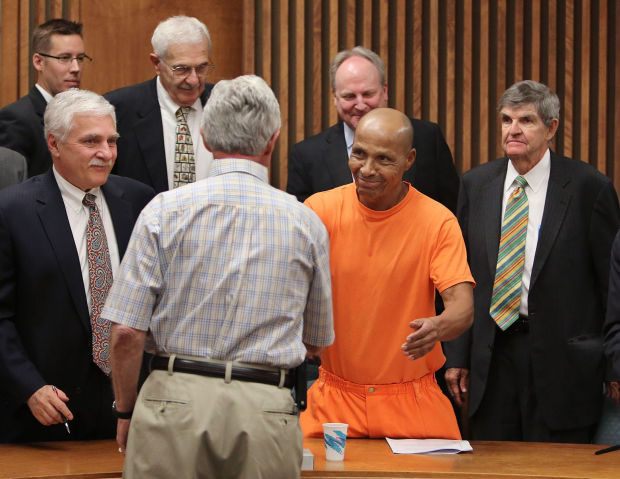His trial and conviction remain among the most controversial in Pima County’s history.
Louis Taylor, just a teenager when he was convicted of starting a fire that caused 29 deaths at the Pioneer Hotel in 1970, was released in April 2013 after more than 42 years in prison.
Since then, he’s shifted between apartments and hotels, and even spent some time on the streets.
“Everything hasn’t been easy, but I’m trying,” Taylor said.
Some supporters have started a
gofundme.com page for Taylor, asking people to donate to help pay his expenses while he transitions to a life of freedom. There’s also the potential for a civil case against the state seeking recompense for the years he lost to incarceration.
Taylor, 60, was convicted in 1972 in a trial fraught with difficulties — to the inclusion of fire-science evidence that wouldn’t remotely meet modern standards to a prosecutor who ran roughshod over the proceedings, objecting some 2,000 times during the course of the trial.
In addition, attorneys working to secure Taylor’s release found, the prosecutor had telephone conversations about the case with the trial judge before the trial’s start.
He was released from prison in 2013 after pleading no contest in plea agreement that set aside his original conviction.
Taylor has steadfastly maintained his innocence over the decades.
“No, I did not; unconditionally not,” Taylor said when asked whether he started the tragic fire in 1970.
Taylor has gotten ample support in the more than a year since his release from prison.
Thousands of dollars were raised to pay his living expenses, and other benefactors provided free or greatly-reduced-cost living accommodations for Taylor.
Much of that has proved fleeting, and Taylor has recently found himself living outdoors at times.
“It’s dangerous out there,” Taylor said. “You’ve got to be mindful.”
He found that out the hard way, he said, describing how earlier this year some men jumped him. They smashed him over the head with what he said was bicycle lock and took his bike, which one of his supporters had given him.
“He’s had some difficulties in adjusting,” attorney John Leader said.
Leader said he plans to have Taylor meet with a career guidance counselor who can help assess his vocational strengths and help him find sustainable work.
“Part of the vocational rehab is to get Louis some direction,” Leader said.
Taylor did learn some work skills in the 42 years of his incarceration, earning a degree to work as a medical technician and assisting with minor procedures. For a time he worked in the prison hospital and emergency department.
“I enjoyed working in the hospital,” he said.
But that was many years ago, and his certifications have lapsed and the technologies have changed.
He faces more difficulties in finding long-term work and stability because of his prison record and a lack of many basic life skills most people take for granted.
“I don’t even know how to drive a car,” Taylor said.
In addition to helping Taylor find work, Leader said he intends to file a civil lawsuit against the state on Taylor’s behalf.
Typically, former inmates found to have been innocent of the crimes they were convicted of file suit against the state.
Taylor’s case is different, however, because he’s never been exonerated.
That fact puts his standing to file a civil case in some jeopardy, but Leader said there might be some precedent.
A recent ruling from the 9th U.S. Circuit Court of Appeals allowed a man twice convicted of murder to sue the state of California.
In that case, the defendant was originally charged with first-degree murder and convicted at trial. But that conviction was overturned because the prosecution relied on evidence that was gotten in violation of the defendant’s Miranda rights.
He was tried a second time and again convicted. The second conviction was allowed to stand, but the Appeals Court allowed the convicted man to amend a claim against the county attorney who prosecuted his initial case.
Attorneys working for Taylor’s release alleged three instances of prosecutorial misconduct in his trial. While the civil case has not yet been filed, some of those claims and challenges to the validity of the scientific evidence would likely appear in that complaint.
“I think the vast majority of people believe that he was wronged,” Leader said.
Even so, Leader said Taylor’s reintroduction to normal life outside of a prison’s walls has been a day-to-day struggle. Taylor acknowledged the difficulties in adjusting and shaking the perception that people may have of him.
“Tucson and Phoenix are so unforgiving,” he said. “All I want to do is coexist in society just like everybody else.”







